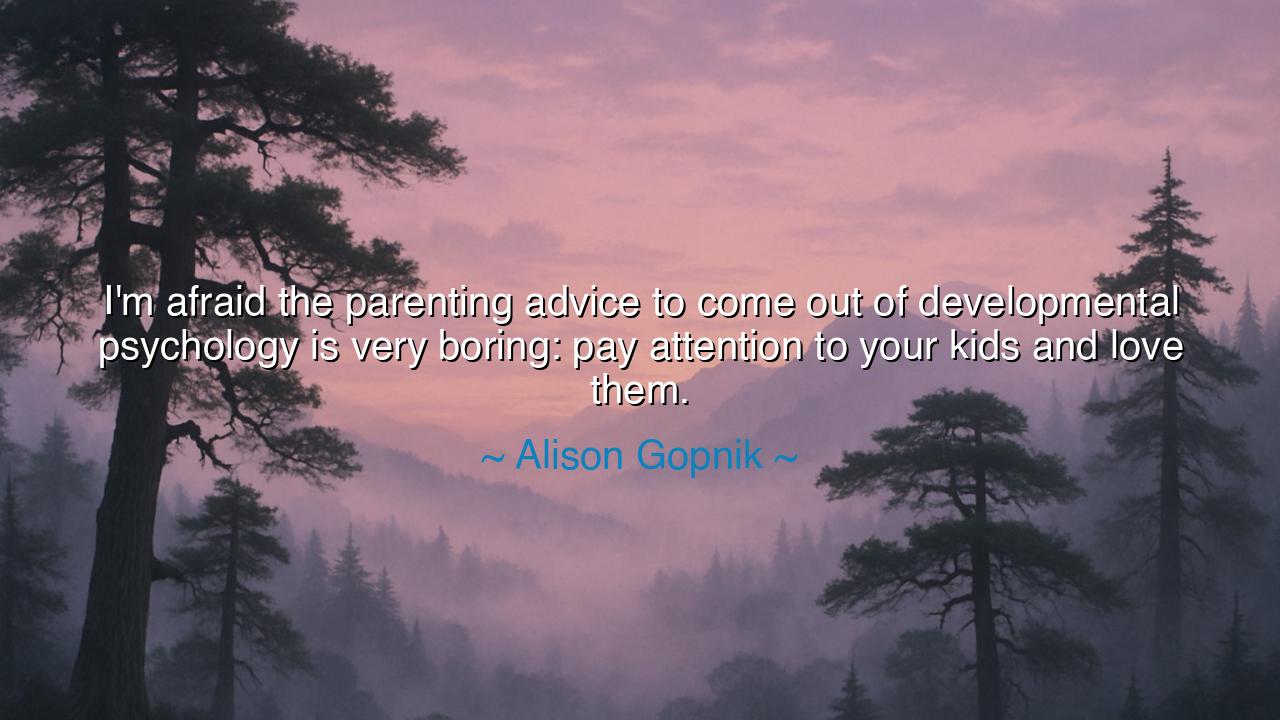
I'm afraid the parenting advice to come out of developmental
I'm afraid the parenting advice to come out of developmental psychology is very boring: pay attention to your kids and love them.






Hear, O seekers of timeless truth, the words of Alison Gopnik, who strips away the noise of a thousand manuals and theories, declaring with clarity: “I’m afraid the parenting advice to come out of developmental psychology is very boring: pay attention to your kids and love them.” In her humble phrasing lies a wisdom deeper than ornamented teachings, for she reminds us that the greatest acts are often the simplest, and that the roots of parenting are not found in elaborate strategies but in attention and love.
The origin of this insight lies in Gopnik’s work as a developmental psychologist, where she studied the minds of children and the nature of their growth. Surrounded by data, research, and complex theories, she came to the conclusion that the heart of the matter was not technical, but elemental. Children thrive when their guardians are present, when their voices are heard, and when affection is freely given. Thus, the advice appears “boring” only to those seeking novelty, but in truth it is profound: for what could be more essential than to see and to love?
History too confirms this eternal principle. Consider the story of Abraham Lincoln, whose stepmother, Sarah Bush Lincoln, gave him what his life had sorely lacked: attention and love. Though she was not his birth mother, her care and encouragement lit the fire of learning in him, fostering resilience and purpose. From the humble cabin to the heights of the presidency, he carried the fruits of that simple parenting—proof that the greatest legacies come not from wealth or complexity, but from devotion and presence.
The emotional resonance of Gopnik’s words is powerful. In an age of parenting books, philosophies, and anxieties, her reminder strips away excess and returns us to the center. Attention means seeing the child as a full being, listening with patience, noticing their fears, joys, and curiosities. Love means creating a safe harbor, a constant assurance that no matter the storms of life, they are cherished. These two together form the soil in which resilience, wisdom, and compassion grow.
Practically, her insight offers a path for weary parents who feel overwhelmed by competing advice. Instead of worrying over methods or fearing imperfection, they can focus on what is within reach: to be present, to listen, to share affection, to allow the child to feel secure in their place within the family. When these foundations are strong, the finer details matter far less. The house of parenting does not stand on theories, but on the steady stones of presence and love.
Her words also carry a heroic dimension, for though the advice seems simple, it is not easy. To give true attention requires sacrifice in a world filled with distractions. To give true love requires patience even in moments of exhaustion and frustration. Yet those who commit to these labors stand among the greatest of guardians, for their work shapes not only the lives of their children, but the very future of society.
From this truth arises a lesson for all: let not your heart be troubled by the endless voices of complexity. Let your foundation be attention and love, and you will not fail. Each day, pause to see your child with open eyes, to hear them with open heart, and to remind them with word and action that they are loved. In doing so, you fulfill the most ancient and noble task of humanity.
Thus, Alison Gopnik’s teaching endures: though the world may hunger for cleverness, the true wisdom of parenting is beautifully simple. Pay attention. Love them. Let this be the scroll passed to future generations, for in these two commandments lie the strength of families, the flourishing of children, and the renewal of the human race.






AAdministratorAdministrator
Welcome, honored guests. Please leave a comment, we will respond soon